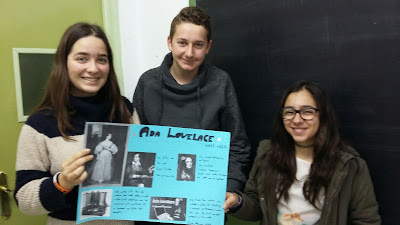Last week,
our bilingual students from 2ºESO researched about the lives of 5 remarkable female
mathematicians from different ages, in order to commemorate women’s day. The are: Hypatia
(350 – 415), Sophie
Germain (1776 – 1831), Ada
Lovelace (1815 – 1852), Sofia
Kovalevskaya (1850 – 1891) and Emmy
Noether (1882 – 1935). Their
contribution to Science continues being used during current days.
Showing posts with label International Women's Day. Show all posts
Showing posts with label International Women's Day. Show all posts
Friday, 10 March 2017
Wednesday, 8 March 2017
Women's Day 2017
The original aim of Women's Day –that is, to achieve full gender equality for all women in the world– has still not been realised. A gender pay gap persists across the globe and women are still not present in equal numbers in business or politics. Women’s education, health and violence towards women is still worse than that of men.
The gender gap is still wide open. So the fight can't be over.
Let's come together to force the world to recognise these inequalities – while also celebrating the achievements of women who have overcome these barriers.
#activism #BeBoldForChange #WomensDay #women #womensrights #bethechange #fight #internationalwomensday #wecandoit #yeswecan
via BBC
The future
Can you imagine a future where there’s no need at all to even have an International Women’s Day? Where there is total equality for men and women? Hmmm … something to think about but perhaps in your lifetime this could happen!?
Useful websites:
International Women’s Day: www.internationalwomensday.com
UNWomen: www.unwomen.org
HeForShe: www.heforshe.org
BBC report: http://www.bbc.co.uk/news/uk-18187449
International Women’s Day: www.internationalwomensday.com
UNWomen: www.unwomen.org
HeForShe: www.heforshe.org
BBC report: http://www.bbc.co.uk/news/uk-18187449
Friday, 24 February 2017
Monday, 20 February 2017
International Women's Day
International Women's Day
via BBC

What is International Women’s Day?
International Women’s Day takes place every year on 8 March to celebrate the achievements of women all over the world. It started with a protest that took place in New York City in 1908 where women went out onto the streets to demand the right to vote, shorter working hours and better pay. Since then it has taken many forms and today it’s a global event that is supported by lots of charities, NGOs, governments and academic institutions. In some countries, March 8 is an official holiday and in other countries it’s an official holiday but only for women.
Why do we need an International Women’s Day?
In today's world it may appear that women have all the same opportunities as men. If you watch the news you will see women astronauts, women prime ministers and women leaders in business. However, if you look at the statistics you realise there’s still a long way to go. The BBC did a report a few years ago that showed that in the UK women occupied only 30.9% of the most senior positions across a range of jobs in areas like politics, business and policing. So, although progress has been made since 1908, there is still a lot to do before we see an equal number of men and women in the top jobs and receiving equal pay.
How is IWD celebrated in the UK?
A lot of special events take place in towns and cities all over the UK to celebrate International Women’s Day. There are exhibitions, theatre shows, talks, discussions, walking tours, films, workshops, fun runs and so much more. All the events are designed to celebrate the role of women in society and to make us all take a step back and think about the progress that has been made, but also about the changes that still need to take place to ensure the world is a fair and equal place for all its citizens. To find out what is happening in your country have a look on the events page of the International Women's Day website.
Think globally and act locally
The message for women around the world is to ‘think globally and act locally’. This means to learn about some of the key issues that women face around the world and then to try to take action close to home. Emma Watson, the actress who played Hermione in the Harry Potter films, is a great example of someone who is doing something to raise awareness about the issues that women face globally. She has launched a campaign called HeForShe, which aims to get people talking at all levels about gender equality. The aim is to create a ‘gender-equal world’. The HeForShe campaign makes it very clear that it’s the role of men as well as women to make changes in all areas of their lives, both at work and in the family, to help make this possible. With the support of UN Women, the United Nations organisation to support women, Emma’s campaign is surely going to make a big impact.
The future
Can you imagine a future where there’s no need at all to even have an International Women’s Day? Where there is total equality for men and women? Hmmm … something to think about but perhaps in your lifetime this could happen!?
Useful websites:
International Women’s Day: www.internationalwomensday.com
UNWomen: www.unwomen.org
HeForShe: www.heforshe.org
BBC report: http://www.bbc.co.uk/news/uk-18187449
International Women’s Day: www.internationalwomensday.com
UNWomen: www.unwomen.org
HeForShe: www.heforshe.org
BBC report: http://www.bbc.co.uk/news/uk-18187449
FURTHER ACTIVITIES
This week’s lesson touches on some of the issues surrounding International Women’s Day, which is celebrated every year on 8th March in many countries around the world.
- British Versions
- Student's Worksheets0.09mbpdf
- Student's Worksheets0.04mbword
- Teacher's Worksheets0.1mbpdf
- Glossary0.11mbpdf
Saturday, 5 March 2016
Subscribe to:
Posts (Atom)







